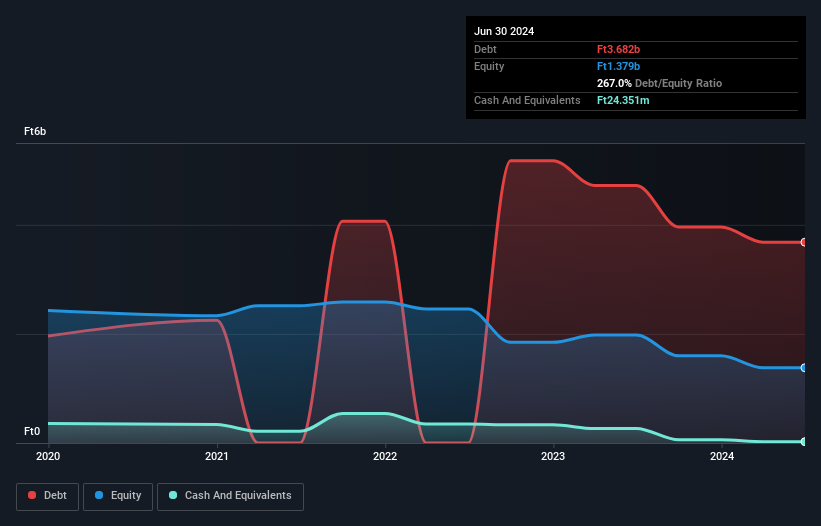- Hungary
- /
- Trade Distributors
- /
- BUSE:DMKER
Is DM-KER Nyilvánosan Muködo Részvénytársaság (BUSE:DMKER) Weighed On By Its Debt Load?

Some say volatility, rather than debt, is the best way to think about risk as an investor, but Warren Buffett famously said that 'Volatility is far from synonymous with risk.' So it seems the smart money knows that debt - which is usually involved in bankruptcies - is a very important factor, when you assess how risky a company is. As with many other companies DM-KER Nyilvánosan Muködo Részvénytársaság (BUSE:DMKER) makes use of debt. But the real question is whether this debt is making the company risky.
What Risk Does Debt Bring?
Generally speaking, debt only becomes a real problem when a company can't easily pay it off, either by raising capital or with its own cash flow. Ultimately, if the company can't fulfill its legal obligations to repay debt, shareholders could walk away with nothing. However, a more frequent (but still costly) occurrence is where a company must issue shares at bargain-basement prices, permanently diluting shareholders, just to shore up its balance sheet. Of course, plenty of companies use debt to fund growth, without any negative consequences. The first thing to do when considering how much debt a business uses is to look at its cash and debt together.
See our latest analysis for DM-KER Nyilvánosan Muködo Részvénytársaság
What Is DM-KER Nyilvánosan Muködo Részvénytársaság's Net Debt?
The image below, which you can click on for greater detail, shows that DM-KER Nyilvánosan Muködo Részvénytársaság had debt of Ft3.68b at the end of June 2024, a reduction from Ft4.72b over a year. Net debt is about the same, since the it doesn't have much cash.

How Strong Is DM-KER Nyilvánosan Muködo Részvénytársaság's Balance Sheet?
We can see from the most recent balance sheet that DM-KER Nyilvánosan Muködo Részvénytársaság had liabilities of Ft5.31b falling due within a year, and liabilities of Ft2.14b due beyond that. Offsetting this, it had Ft24.4m in cash and Ft693.0m in receivables that were due within 12 months. So it has liabilities totalling Ft6.73b more than its cash and near-term receivables, combined.
This deficit casts a shadow over the Ft4.17b company, like a colossus towering over mere mortals. So we definitely think shareholders need to watch this one closely. After all, DM-KER Nyilvánosan Muködo Részvénytársaság would likely require a major re-capitalisation if it had to pay its creditors today. There's no doubt that we learn most about debt from the balance sheet. But it is DM-KER Nyilvánosan Muködo Részvénytársaság's earnings that will influence how the balance sheet holds up in the future. So if you're keen to discover more about its earnings, it might be worth checking out this graph of its long term earnings trend.
Over 12 months, DM-KER Nyilvánosan Muködo Részvénytársaság made a loss at the EBIT level, and saw its revenue drop to Ft7.5b, which is a fall of 45%. That makes us nervous, to say the least.
Caveat Emptor
While DM-KER Nyilvánosan Muködo Részvénytársaság's falling revenue is about as heartwarming as a wet blanket, arguably its earnings before interest and tax (EBIT) loss is even less appealing. Indeed, it lost Ft229m at the EBIT level. When we look at that alongside the significant liabilities, we're not particularly confident about the company. We'd want to see some strong near-term improvements before getting too interested in the stock. Not least because it had negative free cash flow of Ft752m over the last twelve months. That means it's on the risky side of things. The balance sheet is clearly the area to focus on when you are analysing debt. But ultimately, every company can contain risks that exist outside of the balance sheet. For example, we've discovered 3 warning signs for DM-KER Nyilvánosan Muködo Részvénytársaság (1 makes us a bit uncomfortable!) that you should be aware of before investing here.
When all is said and done, sometimes its easier to focus on companies that don't even need debt. Readers can access a list of growth stocks with zero net debt 100% free, right now.
New: Manage All Your Stock Portfolios in One Place
We've created the ultimate portfolio companion for stock investors, and it's free.
• Connect an unlimited number of Portfolios and see your total in one currency
• Be alerted to new Warning Signs or Risks via email or mobile
• Track the Fair Value of your stocks
Have feedback on this article? Concerned about the content? Get in touch with us directly. Alternatively, email editorial-team (at) simplywallst.com.
This article by Simply Wall St is general in nature. We provide commentary based on historical data and analyst forecasts only using an unbiased methodology and our articles are not intended to be financial advice. It does not constitute a recommendation to buy or sell any stock, and does not take account of your objectives, or your financial situation. We aim to bring you long-term focused analysis driven by fundamental data. Note that our analysis may not factor in the latest price-sensitive company announcements or qualitative material. Simply Wall St has no position in any stocks mentioned.
About BUSE:DMKER
DM-KER Nyilvánosan Muködo Részvénytársaság
Engages in the distribution and servicing of agricultural and construction machinery in Hungary.
Slight and overvalued.
Market Insights
Community Narratives




